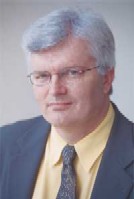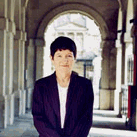|
|
|
|
|
|
|
News & Views item - April 2007 |
![]() Cambridge and Professor Richard -- Melbourne and Professor Davis. (April
11, 2007)
Cambridge and Professor Richard -- Melbourne and Professor Davis. (April
11, 2007)
Glyn Davis took over the vice-chancellorship of The University of Melbourne in January 2005. Alison Richard was installed as the 344th Vice-Chancellor of the University of Cambridge on 1 October 2003.
Their approaches to revitalising their charges are instructionally different,
although their fundamental rationale with regard to resource dependency is
comparable.

Professor Davis has undertaken to redesign Melbourne University by reproportioning its ratio of graduate to undergraduates by markedly reducing over time the number of undergraduates and to radically reduce their options in determining the make up of their degrees.
He has also called for carte blanche in determining course fees.
Whether or not Professor Davis' approach will be significantly beneficial for his university as a seat of learning and research in a moot question.
Professor Richard as provost of Yale University for eight and a half years, was responsible for academic programs and the university's finances. During her tenure as Provost Yale's endowment increased from US$4 billion to US$11 billion and is currently estimated to by something over US$20, second only to Harvard's.
As The Australian's Catherine Armitage reports twelve months into her vice-chancellorship Professor Richard launched a £1 billion fundraising campaign, built around the university's 800th anniversary in 2009. So far she has raised half of it (the university's overall endowment is calculated to be £4.1 billion (2006, incl. colleges).
Professor Richard caused quite a stir in determining to hire a City financier as Cambridge's chief investment officer to manage the university's endowment fund, previously the province of an internal advisory group overseen by a committee. She also persuaded Yale's chief investment officer David Swenson to join a new external investment advisory board comprising alumni with "a very high level and a considerable range of financial expertise".
In addition Ms Armitage reports:
[Professor Richard] said it was a remarkable tribute to Cambridge that it remained among the world's top universities given its small budget. The research enterprise at Cambridge was "stunning for its quality and vitality".
The university does "more with less" than any of its competitors and "while I consider frugality a virtue, at some point frugality trails off into non-competitiveness", she said.
"In the long run we have to strengthen that budget and put more resources into what we are doing, particularly in support of graduate students and faculty. We have to reduce our dependence on government because I think the honest independence of a university is best served by not being too dependent on any single source of funding."
But Professor Richard in her Annual Address to the Regent House on October 2 last year shows just where she differs not only with Glyn Davis but Australia's Minister for Education, Science, and Training, Julie Bishop. She concluded with:
Undergraduate education at Cambridge has been reinvented many times over the centuries. Change is nothing new here: it happens quietly all the time. Is there is a need today, however, for more, bigger change? By the measures we have, Cambridge undergraduates are not only very talented but also very well-educated. Our graduates are sought after, because they bring to their endeavours great discipline and qualities of mind, a depth of knowledge matched by few, and a certain coherent breadth of knowledge.
Still, I believe there is a question for us: should we do more to increase breadth and choice within undergraduate education, and could we accomplish this without sacrificing the exceptional depth for which Cambridge is justly renowned?
Perhaps there could be greater breadth of the kind that already exists without it being at the expense of depth. Perhaps more time is necessary to accommodate greater breadth. Perhaps it could simply be made easier to pursue the opportunities already available. There is a Natural Sciences Tripos, and so why not a Social Sciences Tripos, or a Humanities Tripos? Could permitted 'borrowings' from other Triposes be wider-ranging without losing their coherence? Do our courses follow conventional pathways at the expense of the less trodden? Should students have more opportunity to broaden their knowledge toward the end of their studies, when they understand better what more they might wish to learn? Questions like these, and there are many others, are best considered by those who teach, by the Faculties, supporting staff, and deliberative bodies. But consider them we must.
In contemplating change, it is important that we not compromise or lose sight of what we value most. We need to understand clearly what we are doing and why we are doing it, and explain forcefully the particular strengths of our system of education. At the same time, we must respond to what is going on around us, adapt, and evolve.
Three years ago I told you that I would do my best to make sure that we recognize the challenges we face and choose where to focus our energies and investments within the broad domains implied by our values. My observations this morning are part of a continuing effort to fulfil that responsibility.